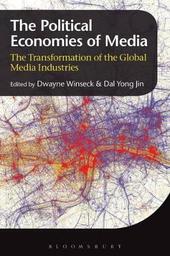
|
The Political Economies of Media: The Transformation of the Global Media Industries
Paperback / softback
Main Details
| Title |
The Political Economies of Media: The Transformation of the Global Media Industries
|
| Authors and Contributors |
Edited by Dr. Dal Yong Jin
|
|
Edited by Prof. Dwayne Winseck
|
| Physical Properties |
| Format:Paperback / softback | | Pages:336 | | Dimensions(mm): Height 234,Width 156 |
|
| ISBN/Barcode |
9781849668934
|
| Classifications | Dewey:338.4730223 |
|---|
| Audience | | Tertiary Education (US: College) | | Professional & Vocational | |
|---|
|
Publishing Details |
| Publisher |
Bloomsbury Publishing PLC
|
| Imprint |
Bloomsbury Publishing PLC
|
| Publication Date |
8 March 2012 |
| Publication Country |
United Kingdom
|
Description
This book is available as open access through the Bloomsbury Open Access programme and is available on www.bloomsburycollections.com. Some advocates and more than a few critics have misconstrued the political economy of media as a unified field of inquiry. The authors from this volume, by contrast, draw from a more diverse stream of the schools of thought signified by this tradition: Neoclassical Economics, Radical Media Political Economy, Schumpeterian Institutional Political Economy, and the Cultural Industries School. The book as a whole is as alert to developments in our main objects of analysis - media institutions, technologies, markets, uses and society - as it is to changes in the world around us, including current trends in communication and media studies. The contributors show that digital media are disrupting entire media industries, but without erasing the past. Throughout, the impact of the unprecedented wave of media consolidation in the late-1990s and the financial crisis of the past few years loom large. The authors also suggest that there is no 'supra logic' of 'total system integration' that spans the network media, while insisting that one media sector is not the same as the next. Social networking activities often beg, pilfer and borrow 'content' from 'traditional media', but it remains the case that Time Warner, Comcast, the BBC and News Corp. are very different creatures than Apple, Baidu, Facebook or Google. In other words, even in the age of convergence and remix culture, different media continue to display their own distinctive political economies, as the volume's title - The Political Economies of Media - signals.
Author Biography
Dwayne Winseck is Professor at the School of Journalism and Communication, Carleton University, Canada. Dal yong Jin is Assistant Professor at Simon Fraser University and Associate Professor at Korea Advanced Institute of Science and Technology.
ReviewsThe Political Economies of Media is the most thoughtful, original and compelling set of essays on contemporary global media industries that I have ever read. Dwayne Winseck and Dal Yong Jin are to be congratulated for shepherding and contributing to this crucial contribution to media studies. It should be mandatory reading for scholars, studentts and concerned citizens * Robert W. McChesny, University of Illinois at Urbana-Champaign * Winseck and Jin's excellent collection is one of the most important contributions in years to research and teaching in media industries. * David Hesmondhalgh, University of Leeds * This excellent book analyzes how the forces of digitalization, financialization, globalization, and consolidation affect today's media. In a world full of clarion calls, The Political Economies of Media stands out as essential reading: thoughtful interpretations in a well-organized volume, timely and useful information, a wide coverage of industries and countries, a highlighting of the diversity within political economy, and a willingness to question conventional wisdom when warranted by the data. * Eli Noam, Columbia Business School and Columbia Insitute for Tele-Information * Political Economies of the Media: The Transformation of the Global Media is probably one of the most inspiring books in political economy I have read in recent years. A wide variety of topical issues is debated and statements are underpinned by an impressive amount of empirical data... This book is a must-read for everyone interested in the structural mechanisms underlying power and control in the media and information industries. -- Tom Evens, Ghent University * Journal of Digital Television *
|